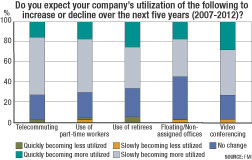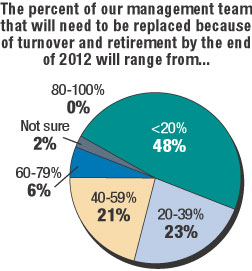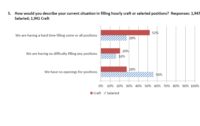| + click to enlarge |
 |
More companies see training and development as a high return investment, according to a survey done by the Engineering and Construction Contracting Association, a group that brings together owners, contractors and suppliers in the process and industrial sectors.
The survey was done for a session on organizational strategies at the group’s annual conference that drew 500 attendees to Colorado Springs Sept. 26-29. “The three big issues that bubbled up last year were collaboration, technology and organization,” says Stephen L. Cabano, 2007 ECC chair and president and COO of Pathfinder, an industrial consultant.
Session moderator John Moore, director of technical services for BASF Corp., adds that the study was seen as a “foundational issue” because organization and the people side are key enablers to the collaboration and innovation that drive successful projects and companies.
 FMI |
FMI Corp., Raleigh, N.C., conducted the research for ECC, receiving 112 responses and conducting 25 followup interviews with industry leaders. “Strategies for attracting and retaining talent are dominant issues,” says Chip Andrews, FMI chairman. Respondents said there are not enough competent managers in the industry to perform today’s work, and it’s going to get worse. The average respondent expects work volume to increase 79% in the next five years. The workforce is made up of 15 to 20% new hires. In addition, 23% said between 20 and 39% of their management team will be replaced in the next five years, and 21% said 40 to 59% will not be on board in five years. “What we heard was, ‘There is a lot of work in front of us, but we aren’t sure we can staff it with capable people,’” says Andrews.
The average respondent expects training and development spending to double in five years, Andrews says. On average that’s from $8,700 annually per professional, to about $13,000 a year. The highest response received was current spending on training and development of $50,000 going to $100,000 in five years.
The aging of baby boomer managers is another big issue, Andrews says. In addition to “ferocious recruiting and massive training,” many firms are struggling to reinvent retirement.
Survey results and session presentations can be found at http://www.ecc-conference.org/39/index.html


Post a comment to this article
Report Abusive Comment